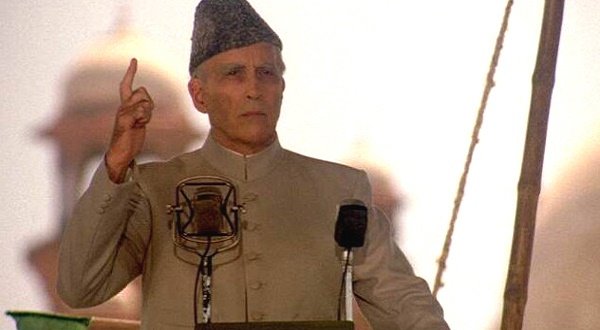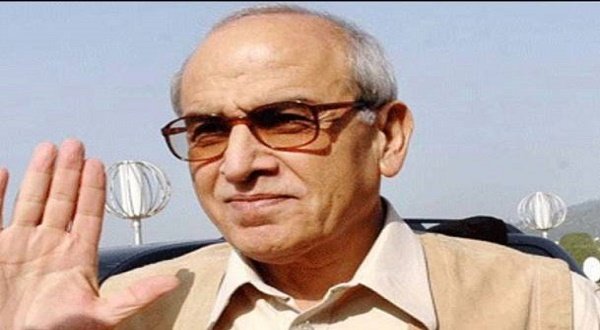
Former Pakistan president Farooq Leghari’s unconditional support for initiatives like the biopic on Jinnah came from his fiercely patriotic understanding of and love for Pakistan
PROF AKBAR S AHMED
“Beware of the Indians and other enemies of Pakistan,” said Farooq Leghari , the president of Pakistan, looking at me straight in the eye. “They will do everything possible to destroy your project. They can’t stand Mr Jinnah and his achievement of creating Pakistan.”
Leghari was talking to me in a one-to-one conversation in his office in 1996. He had been my senior at Forman Christian College where we both played tennis in the college team. Later when I entered the civil service of Pakistan, which he had already joined, he maintained the affections of an elder brother. I called him Lala or elder brother. In this case, I had come to enlist his support for Jinnah, my film project on the life of the founder of Pakistan.
“Of course,” he said, “I will be there to fully support you and ensure no harm comes to you.” As a Baloch, he was a man of honor and true to his word. When I requested for what seemed an impossible request, the use of the magnificent presidential bodyguard for a scene in the film depicting Jinnah’s cavalcade as governor general, without hesitation he sent it down to Karachi. He wrote to all the ministers and governors asking that full cooperation be shown to me in my efforts.
On my request, Leghari arranged a meeting at the presidential palace for Pakistan’s top 30 industrialists who made commitments for my budget in his presence. Unbeknownst to Leghari, my elation was only to be brought down with a thump when one of them, who had promised Rs3 million, was heard boasting to friends at the Marriott hotel after the meeting that he would follow his father’s footsteps who made similar promises of Rs1 million to President Ayub Khan after the floods in East Pakistan but did not pay a single rupee.

Three years later, when Leghari was no longer president, I showed him the Jinnah film at his home in Islamabad. He had aged. It seemed the weight of the world was on his shoulders. There were all kinds of wild and hateful accusations against him in the press. The two of us sat on a couch in his living room surrounded by his family. They saw the film with rapt attention. When it was over, Leghari stood up, his eyes glistening with tears. He embraced me and said, “You have done a great service to the Pakistani nation. I thank you on their behalf and on my own.”
“But I have a complaint against you Lala,” I said. He looked taken aback and puzzled.
“You warned me about the Indians and others. But you didn’t warn me about our beloved fellow Pakistanis. They almost destroyed me and my film with lies and malice. You should have warned me about our own people.”
Leghari threw his head back and laughed with the familiar carefree laughter that took me back three decades to the time we were together at college in Lahore. With a broad grin, he murmured, “Yes and look what they did to me.”
The idea of making a film on Mr Jinnah was the ambition of many Pakistanis especially after seeing Attenborough’s Oscar-winning film Gandhi which depicted Jinnah as a villainous caricature. Muslims also needed to answer the question so many were legitimately asking about the compatibility of Islam with democracy. Because I believed Jinnah was the quintessential modern Muslim democrat, his story would answer the question about Islam and democracy. His Pakistan was to be a modern democratic Muslim nation. I began working on a script for Jinnah when I arrived at Cambridge University in 1988 to take up the position of the Iqbal Chair.
Supported by family and friends, I spent the next decade producing books and films that would tackle two subjects — Islam and Jinnah. “Living Islam”, based on my book Discovering Islam, was broadcast at prime time as a six-part BBC television series which I hosted.
Desperate times call for desperate measures and I decided to work on the “Jinnah Quartet”: to make Jinnah, a feature film and Mr Jinnah: The making of Pakistan , a documentary based on archival material and rare interviews including that of Jinnah’s daughter Dina, to write Jinnah, Pakistan and Islamic Identity, an academic book, and commission and write a comic book on Jinnah. I set myself a deadline — 1997, the fiftieth anniversary year of Pakistan. Despite the huge challenges and obstacles, three of the Quartet were completed on time. The Jinnah feature film was ready by the following year.
Along with friends, we had set up a company called Quaid Project Limited to make the feature film. I was the managing director of the company and owned its single share. The other members of the board included such distinguished Pakistanis as Jamy Rahim and Amir Chinoy, well-known names in industry and finance, and the equally distinguished British statesmen Sir Julian Ridsdale, former MP, and Sir Oliver Forster, former High Commissioner to Pakistan. No one on the board was paid and it was often a thankless job, yet the support and loyalty of the directors never wavered and I will always be grateful to them.
Earlier projects to make films on Jinnah had faltered. People warned me that “Jinnah was jinxed”. Despite all the confidence people had in me, I was aware of the problems of working in Pakistan. I had described Pakistanis as living in a “dodge’m car culture” — not unlike the carnival game in which bumper cars slam into each other from every direction without warning.
There has been, typically, ad nauseam controversy about the Jinnah film and I have no intention of further feeding it. (For those interested in information on Jinnah and its making, please see Dare to Dream; https://www.youtube.com/watch?v=VKmJFbWXuzc . For a report of the launch of Jinnah see The Independent, London: http://www.independent.co.uk/arts-entertainment/was-jinnah-a-saint-or-sinner-1184528.html . For a detailed audit report of the Jinnah film, see website link, http://pdfsr.com/pdf/jinnah-film-audit-report-1 . For a detailed analysis of the Jinnah Quartet, see my book Islam under Siege, 2003).
Unfortunately little has been said of the many Pakistanis who supported Jinnah over the decade that I worked on it. It is my intention to correct the record and acknowledge some of them in this series and pay tribute to them.
I last saw Leghari at a hospital in Washington DC in the summer of 2006 where he had come for a major heart operation. He was not meeting anyone but was good enough to see me and spend time happily talking to me. I was saddened to see his condition. As I left him, I thought of the dashing tennis star at college and I could not stop my tears. He died not long after. I knew his unconditional support for Jinnah came from his fiercely patriotic understanding of and love for Pakistan.
This originally appeared in the Express Tribune published from Pakistan

